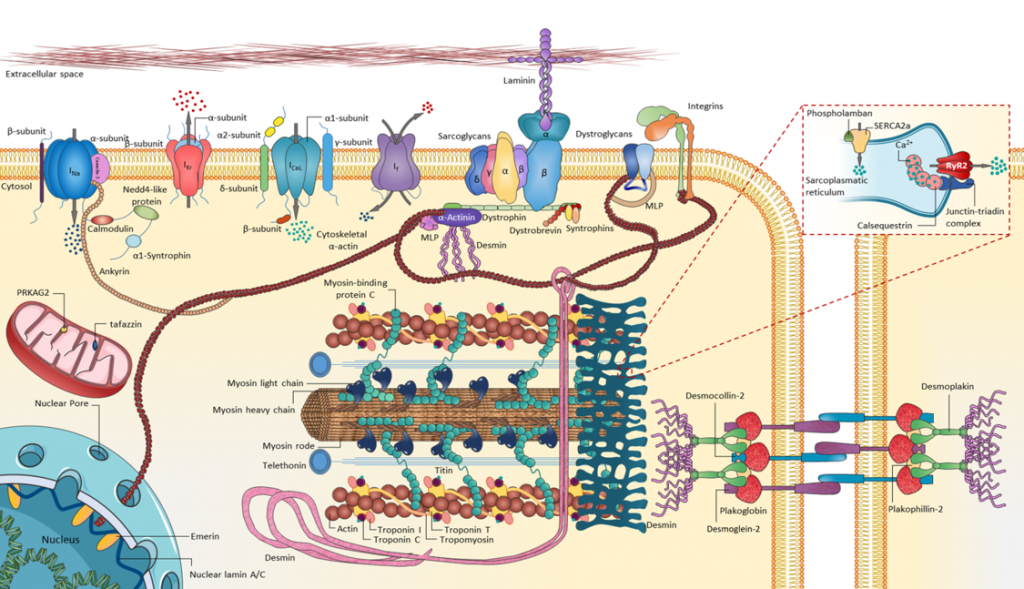Definition
Dilated cardiomyopathy (DCM) is a disorder of the heart, characterized by progressive systolic dysfunction of the ventricles, frequently resulting in congestive heart failure. DCM is the most common among cardiomyopathies and has an incidence rising steadily with age. The incidence of DCM in children <18 years of age comprises approximately 0.57 case per 100 000 children/year, and reaches up to 5.5 cases per 100,000/year in adults. DCM is a common phenotype for multiple etiologic influences including heritable factors, excessive alcohol intake, vitamin deficiency, toxins, infections, pregnancy, etc. In children, two thirds of DCM cases are idiopathic, while in adults, DCM phenotype is more commonly consequence of underlying coronary artery disease. A common feature of DCM regardless of etiology is its propensity to thromboembolic disease, ventricular arrhythmias and sudden cardiac death. When all phenocopies are excluded, the disease is referred as idiopathic DCM. The prevalence of idiopathic DCM is estimated to be 36 per 100 000 population, but the revisited estimations show it can be as high as 1:250. Testing in large-panel of genes allows to identify causative mutation in up to 40-50% of all idiopathic DCM cases, referred as familial DCM.

Why to perform genetic testing in cases with suspected DCM?
- A precise molecular diagnosis, can provide important information on syndromatic DCM forms with varaible penetrance or varable expresion of the disease, usually not suspected before.
- To identify cases at high risk of sudden cardiac death, despite left ventricular ejection fraction > 35% in which an implantable defibrilator may be indicated
- To better assess the prognosis of that specific case (individualized medicine)
- To adjust medical therapy
- To identify other relatives at risk to develop the disease
Our DCM test panel
Core-DCM Panel
BAG3, DES, DSP, FLNC, LMNA, MYH7, PLN, RBM20, SCN5A, TNNC1, TNNT2, TPM1, TTN.
Comprehensive DCM Panel
ABCC9, ACTC1, ACTN2, ANKRD1, BAG3, CAV3, CSRP3, DES, DMD, DSC2, DSG2, DSP, EMD, EYA4, FLNC, GATAD1, ILK, JUP, JPH2, LAMP2, LMNA, LDB3, MYBPC3, MYH6, MYH7, MYL2, MYPN, MYL3, NEXN, NKX2-5, PKP2, PLN, PRDM16, PRKAG2, RBM20, SGCD, TCAP, TMEM43, TNNC1, TNNI3, TNNT2, TPM1, TTN, TTR, RYR2, SCN5A, VCL.
Important: All our panels can be modified based on the phenotype. Please contact us if you have questions
What to expect from the DCM genetic test panel: The general yield of the test is 50%. In familiar forms the yield is usually higher, reaching near 70%.
Recommended Literature
- Arrhythmic Genotypes in Familial Dilated Cardiomyopathy: Implications for Genetic Testing and Clinical Management. Peters S. et al. 2019; Heart Lung Circ. 2019 Jan;28(1):31-38. doi: 10.1016/j.hlc.2018.09.010.
- The need to modify patient selection to improve the benefits of implantable cardioverter-defibrillator for primary prevention of sudden death in non-ischaemic dilated cardiomyopathy. Disertori M. et al. 2013; Europace. 2013 Dec;15(12):1693-701. doi: 10.1093/europace/eut228.
- Genotype-phenotype associations in dilated cardiomyopathy: meta-analysis on more than 8000 individuals. Kayvanpour E. et al. 2017; Clin Res Cardiol. 2017 Feb;106(2):127-139. doi: 10.1007/s00392-016-1033-6.
- Translating emerging molecular genetic insights into clinical practice in inherited cardiomyopathies. Asatryan B, Medeiros-Domingo A. 2018; J Mol Med (Berl). 2018 Oct;96(10):993-1024. doi: 10.1007/s00109-018-1685-y.
- Genetic evaluation of cardiomyopathy: a clinical practice resource of the American College of Medical Genetics and Genomics (ACMG). Hershberger RE. et al. 2018; Genet Med. 2018 Sep;20(9):899-909. doi: 10.1038/s41436-018-0039-z.
Download here interesting open access manuscripts on genetics of DCM


